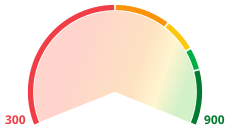Credit Score Meter

Name
Email : Phone:Here are some tips to help you improve your credit score:
Check Your Credit Report Regularly: Obtain a copy of your credit report from credit bureaus like CIBIL and review it for errors or discrepancies. Dispute any inaccuracies and have them corrected.
Pay Bills on Time: Timely payment of your credit card bills, loan installments, and other debts is crucial. Late payments negatively impact your credit score.
Reduce Credit Card Balances: Aim to keep your credit card balances low relative to your credit limits. High credit utilization can hurt your score.
Use Different Types of Credit: A mix of credit types (such as credit cards, loans, and mortgages) can be beneficial. It shows you can manage different kinds of credit responsibly.
Avoid Opening Multiple New Accounts: Opening multiple new credit accounts within a short period can lower your average account age and potentially raise red flags for lenders.
Don’t Close Old Accounts: Closing old, unused accounts can reduce your credit history length. A longer credit history is generally better for your score.
Limit Credit Applications: Applying for credit frequently (especially within a short span) can negatively affect your score. Multiple hard inquiries can indicate financial instability.
Pay Off Debt Strategically: Prioritize paying off high-interest debt first. Paying down balances can have a positive impact on your score over time.
Use Credit Responsibly: Use credit for necessary expenses and manage it responsibly. Avoid overspending and accumulating excessive debt.
Consider Secured Credit Cards: If you’re rebuilding credit, secured credit cards can help you establish a positive payment history. These cards are backed by a security deposit.
Be Patient and Persistent: Improving your credit score takes time. Be patient and consistently practice responsible credit behavior.
Seek Professional Help if Needed: If you’re struggling with debt, consider seeking financial counseling or debt management assistance to develop a plan for improving your credit.
Remember that improving your credit score is a gradual process. It requires consistent effort and responsible financial behavior over time. Keep track of your progress, and as your credit score improves, you’ll be better positioned for financial opportunities.
Here are some frequently asked questions (FAQs) regarding CIBIL scores:
1. What is a CIBIL score?
A CIBIL score is a three-digit numerical representation of your creditworthiness. It’s calculated based on your credit history, payment behavior, and credit utilization, among other factors.
2. How is the CIBIL score calculated?
CIBIL scores are calculated based on various factors, including your payment history, credit utilization, length of credit history, types of credit accounts, and recent credit inquiries.
3. Why is a good CIBIL score important?
A good CIBIL score is crucial for obtaining loans and credit at favorable terms. Lenders use it to assess your creditworthiness and determine whether to approve your applications and what interest rates to offer.
4. What is considered a good CIBIL score?
CIBIL scores range from 300 to 900. Generally, a score above 750 is considered good and increases your chances of loan approval with better terms.
5. How can I check my CIBIL score?
You can check your CIBIL score by visiting the CIBIL website or using authorized credit bureaus’ websites. You are entitled to one free credit report per year from each bureau.
6. How often should I check my CIBIL score?
It’s a good practice to check your CIBIL score at least once a year or before applying for a significant credit facility, such as a home loan or car loan.
7. Can checking my CIBIL score lower it?
No, checking your own CIBIL score is considered a “soft inquiry” and does not impact your score. However, multiple “hard inquiries” by lenders within a short time can have a small negative impact.
8. How long does negative information stay on my credit report?
Most negative information, such as late payments or defaults, stays on your credit report for up to seven years. Bankruptcies may remain for up to ten years.
9. How can I improve my CIBIL score?
To improve your CIBIL score, focus on paying bills on time, reducing credit card balances, maintaining a mix of credit types, and avoiding frequent credit applications.
10. Can I remove negative information from my credit report?
You cannot remove accurate negative information from your credit report. However, you can work to improve your credit behavior over time, which can have a positive impact on your score.
11. How long does it take to improve a CIBIL score?
Improving a CIBIL score takes time and depends on your credit behavior. Positive changes may start reflecting within a few months, while substantial improvements may take a year or more.
12. Can I get a loan with a low CIBIL score?
While it’s more challenging to get a loan with a low CIBIL score, some lenders offer loans for individuals with lower scores. However, the terms may not be as favorable.
Remember that understanding your CIBIL score, managing your credit responsibly, and taking steps to improve it can have a significant impact on your financial health and opportunities.
Working Hours
Mon-Sat 10:00 AM – 6:30 PM
Sun CLOSED
Address
A-47, 1st Floor, Sector-2 Noida, Uttar Pradesh
201301
Call Here
0120-4198166

